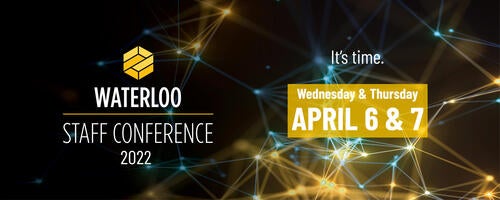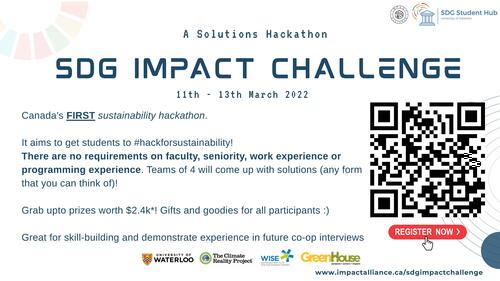The Daily Bulletin is published by Internal and Leadership Communications, part of University Communications
Contact us at bulletin@uwaterloo.ca
Submission guidelines
Editor:
Brandon Sweet
University Communications
bulletin@uwaterloo.ca

A message from Information Systems & Technology
During the pandemic, the immediate need for web conferencing platforms resulted in the rapid adoption of a number of different tools to enable the University to continue, virtually, with classroom and administrative activities. In January, IST issued a survey to members of the campus community seeking feedback on web conferencing needs and functionality requirements with the goal of reducing the growing set of tools IST supports to a more sustainable offering.
The survey received 763 responses from instructors, IT support staff, and students. Of the five web conferencing tools included in the survey, results indicated that Teams then Zoom are the top two preferred platforms, followed by WebEx, Bongo Virtual Classroom, and Adobe Connect.
Based on the survey results, IST support for web conferencing tools will proceed as follows:
Reducing the number of web conferencing platforms to a smaller, sustainable offering will provide a more consistent user experience for students, faculty, and staff across campus while allowing IST to develop an efficient and effective central support model.
Support resources for each of the platforms are available in the IST Knowledge Base: Microsoft Teams, Zoom, WebEx, Bongo Virtual Classroom, How to download Adobe Connect recordings, Comparison of web conferencing tools for synchronous or lecture streaming events.
Questions or concerns about this project, they survey, or support decisions moving forward may be submitted to Pam Fluttert, fluttert@uwaterloo.ca.

Two days of engaging and expert-led workshop sessions, two award-winning keynote speakers, opportunities to connect with colleagues from across campus – it's all happening this April 6 & 7. This is where inspired learning and talented people come together to make high-impact moments. Check out this year’s Waterloo Staff Conference Agenda and Speaker Line-Up.
 The WSC Speaker Series is proud to present this month’s keynote speaker, Kevin Lamoureux, on Wednesday March 16 from 1:00 p.m. to 2:00 p.m. This event will focus on the work of Truth and Reconciliation within the world of academia and is open to all UWaterloo employees.
The WSC Speaker Series is proud to present this month’s keynote speaker, Kevin Lamoureux, on Wednesday March 16 from 1:00 p.m. to 2:00 p.m. This event will focus on the work of Truth and Reconciliation within the world of academia and is open to all UWaterloo employees.
“I am delighted that Kevin Lamoureux has agreed to spend this time with us at UW.” says Jean Becker, Associate Vice-President, Indigenous Relations. “He has a wealth of knowledge and experience in postsecondary and is one of the leading speakers in Canada on issues around reconciliation, the TRC and Indigenous education. He is high on my list of favourite presenters not only because of his skill in doing so but because he always leaves his audience feeling empowered. I know we will all learn from him on March 16.”
Kevin uses his talks as a catalyst and invitation to act, not just as a faculty and staff, but as Canadians. His focus is one we should all share, “a commitment to reconciliation and contributing to an even better Canada for all children to grow up in.”
Registration today on Portal.
This event is brought to you by Organizational & Human Development and the Office of Indigenous Relations.

Graduate and undergraduate students are called to participate in the SDG Impact Challenge: Canada's first sustainability hackathon.
The challenge invites students to #hackforsustainability. Teams of 4 work together to create solutions to a problem statement of their choice, provided by event partners: UW Sustainability Office, WISE, STP Greenhouse, and Climate Reality.
Winning teams have a chance to win:
(*Terms and conditions apply – please visit the website for more information.)
"There are no requirements on faculty, seniority, work experience or programming experience, says a note from the organizing team, Impact Alliance. "Just as we must all come together from all backgrounds to shape our world sustainably, so will you when coming up with solutions." Examples of solutions include engineering design, policy recommendations or even business proposals.
Participants will have access to workshops conducted by several experts from Waterloo Region on entrepreneurship and problem pitching, as well as technical workshops on sustainable development.
Program organizers are looking for professors to mentor students for the challenge. Join their Discord and introduce yourself! An alternate way to support the initiative is to share this opportunity with your classes and networks.
The deadline for students to register is Wednesday, March 9 at 11:59 p.m.
Find out more about the SDG Impact Challenge.
This article was originally published in the Catalyst newsletter.
 Jennisha Wilson, senior manager, Anti-racism in the new office of Equity, Diversity and Inclusion and Anti-racism (EDI-R) will facilitate the March Anti-racism Book Club with a review of Why I’m No Longer Talking to White People About Race on Tuesday, March 15, 2022, from 12:00 p.m. to 1:00 p.m.
Jennisha Wilson, senior manager, Anti-racism in the new office of Equity, Diversity and Inclusion and Anti-racism (EDI-R) will facilitate the March Anti-racism Book Club with a review of Why I’m No Longer Talking to White People About Race on Tuesday, March 15, 2022, from 12:00 p.m. to 1:00 p.m.
Written by Reni Eddo-Lodge, an award-winning journalist, “Why I’m No Longer Talking to White People About Race,” represents an attempt to address frustrations associated with the way that discussions of race and racism are led by those who weren’t affected by it.
While exploring issues such as eradicated Black history, the political purpose of white dominance, whitewashed feminism, and the link between class and race, among other topics, this book has transformed conversations that address acknowledging and countering racism.
Touted to be an essential handbook for anyone looking to understand how structural racism works, Eddo-Lodge pushes readers to recognize that racism is a systemic problem that needs to be tackled by those who run the system.
“This book is a good starting point to initiate what some might consider to be difficult conversations about race and racism,” said Wilson. “Quite often, there is a certain level of discomfort in anti-racism work, but discomfort is a sign of growth. It’s important to embrace discomfort and use it as an opportunity to gain new perspectives and unlearn negative behaviours.”
Wilson looks forward to a having respectful and meaningful dialogue and hopes that the session will serve as a space for learning and action planning to continue the work of building and sustaining racial equality.
Register here for the March Anti-racism Book Club.

This article was originally featured on the Interdisciplinary Centre for Climate Change's website.
The Intergovernmental Panel on Climate Change (IPCC) has released a new report detailing the impacts of climate change on humanity and the environment. The IPCC’s Working Group II (WGII) report, which provides a comprehensive scientific assessment of the impacts and adaptation strategies of a warming planet, is a key input for the United Nations Framework Convention on Climate Change (UNFCCC) and informs international negotiations to address climate change.
Three Interdisciplinary Centre on Climate Change (IC3) members, Luna Khirfan, Robert McLeman, and Linda Mortsch, are lead authors in the recently published Working Group II report. They have worked with top scientists from around the world for the past several years to identify options for creating a sustainable future for all through an equitable and integrated approach to mitigation and adaptation efforts at all scales. This includes IC3 members Hannah Tait Neufeld and Susan Elliott who were contributing authors for sections on Indigenous Health and evaluating health adaptation, which both appear in chapter 7 on health, wellbeing and the changing structure of communities.
“It’s an honour to be recognized for your expertise and nominated by your country to participate in the IPCC,” said Convening Lead Author Linda Mortsch. “I always appreciate the opportunity to collaborate because you’re exposed to leading researchers from around the world and new knowledge, which ultimately informs Canadians to make advances in adapting to climate change.”
The report’s key findings show that urgent action is required to deal with the increasing risks of a warming planet. These include:
To help us further understand the report, Khirfan, McLeman, and Mortsch, discussed the report’s findings and their impacts on Canada in a series of Q&As.
The Working Group II report, along with an earlier report on the physical science of climate change released in the fall of 2021, are part of the IPCC’s sixth assessment of the state of the knowledge of the climate crisis. The third report is scheduled to be released on Monday, April 4, 2022 followed by a synthesis report in fall 2022. University of Waterloo researchers have contributed to each of the IPCC assessments since it was initially formed in 1988.
Students can visit the Student Success Office online for supports including academic development, international student resources, immigration consulting, leadership development, exchange and study abroad, and opportunities to get involved.
Instructors looking for targeted support for developing online components for blended learning courses, transitioning remote to fully online courses, revising current online courses, and more please visit Agile Development | Centre for Extended Learning | University of Waterloo (uwaterloo.ca).
Instructors can visit the Keep Learning website to get support on adapting their teaching and learning plans for an online environment.
Course templates are available within your course in LEARN to help you build and edit your content and assignment pages quickly.
The following workshops, webinars, and events are offered by the KL team (CTE, CEL, ITMS, LIB):
Supports are available for employees returning to campus. Visit IST’s Hybrid Work and Technology guidelines and workplace protocols to assist with the transition.
The Writing and Communication Centre has virtual services and programs to help undergrads, grad students, postdocs and faculty members with academic writing.
Co-op students can get help finding a job and find supports to successfully work remotely, develop new skills, access wellness and career information, and contact a co-op or career advisor.
The Centre for Career Action (CCA) has virtual services and programs to support undergrads, grad students, postdocs, alumni and employees in figuring out what they value, what they’re good at, and how to access meaningful work, co-op, volunteer, or graduate/professional school opportunities. Questions about CCA's services? Live chat, call 519-888-4047, or stop by our front desk in the Tatham Centre between 8:30 a.m. and 4:30 p.m. EST, Monday to Friday.
Drop-in to Warrior Virtual Study Halls on Wednesdays from 5:30 p.m. to 7:00 p.m. Come together in this virtual space to set goals and work independently or in groups each week.
Renison's English Language Institute continues to offer virtual events and workshops to help students practice their English language skills.
If you feel overwhelmed or anxious and need to talk to somebody, please contact the University’s Campus Wellness services, either Health Services or Counselling Services. You can also contact the University's Centre for Mental Health Research and Treatment. Good2Talk is a post-secondary student helpline available to all students.
The Library is open with expanded hours for access to book stacks, drop-in individual study space, bookable group study rooms, drop-in access to computers and printers, book pick-up services and IST Help Desk support. Librarian consultations, Special Collections & Archives and the Geospatial Centre are available by appointment. Full details on current services and hours are available on the Library’s COVID-19 Update webpage.
The Faculty Association of the University of Waterloo (FAUW) continues to advocate for its members. Check out the FAUW blog for more information.
The University of Waterloo Staff Association (UWSA) continues to advocate for its members. Check out the UWSA blog for more information.
The Sexual Violence Prevention and Response Office (SVPRO) supports all members of the University of Waterloo campus community who have experienced, or been impacted, by sexual violence. This includes all students, staff, faculty and visitors on the main campus, the satellite campuses, and at the affiliated and federated Waterloo Institutes and Colleges. For support, email: svpro@uwaterloo.ca or visit the SVPRO website.
The Office of Indigenous Relations is a central hub that provides guidance, support, and resources to all Indigenous and non-Indigenous campus community members and oversees the University's Indigenization strategy.
The Waterloo Indigenous Student Centre, based at St. Paul’s University College, provides support and resources for Indigenous students, and educational outreach programs for the broader community, including lectures, and events.
WUSA supports for students:
Peer support - MATES, Glow Centre, RAISE, Women’s Centre - Visit https://wusa.ca/peersupport to book an appointment either in person or online for the Fall term.
Food Support Service food hampers are currently available from the Turnkey Desk 24/7 in the Student Life Centre. Drop off locations are also open again in SLC, DC, DP, SCH and all residences.
Co-op Connection all available online. Check https://wusa.ca for more details.
Centre for Academic Policy Support - CAPS is here to assist Waterloo undergraduates throughout their experience in navigating academic policy in the instances of filing petitions, grievances and appeals. Please contact them at caps@wusa.ca. More information is available.
WUSA Student Legal Protection Program - Seeking legal counsel can be intimidating, especially if it’s your first time facing a legal issue. The legal assistance helpline provides quick access to legal advice in any area of law, including criminal. Just call 1-833-202-4571.
Empower Me is a confidential mental health and wellness service that connects students with qualified counsellors 24/7. They can be reached at 1-833-628-5589.
GSA-UW supports for graduate students:
The Graduate Student Association (GSA-UW) supports students’ academic and social experience and promotes their well-being.
Advising and Support - The GSA advises graduate students experiencing challenges and can help with navigating university policies & filing a grievance, appeal, or petition.
Mental Health covered by the Health Plan - The GSA Health Plan now has an 80% coverage rate (up to $800/year) for Mental Health Practitioners. Your plan includes coverage for psychologists, registered social workers, psychotherapists, and clinical counselors.
Dental Care - The GSA Dental Plan covers 60 per cent to 70 per cent of your dental costs and by visiting dental professionals who are members of the Studentcare Networks, you can receive an additional 20 per cent to 30 per cent coverage.
Student Legal Protection Program - Your GSA fees give you access to unlimited legal advice, accessible via a toll-free helpline: +1-833-202-4571. This advice covers topics including housing disputes, employment disputes, and disputes with an academic institution.
The Graduate House: Open Monday to Friday 11:30 a.m. to 6:00 p.m. - We’re open to all students, faculty, staff, and community members. The Graduate House is a community space run by the GSA-UW. Capacity is limited to 50 per cent, and Government ID and Vaccination Records will be required for all dine-in guests. Graduate students who paid their fees can still get discounts and free coffee.
Warriors vs. Laurier Blood Donation Battle. Join our “Waterloo Warriors” team on the Blood.ca website or app. #ItsInYouToGive
Healthy Warriors at Home, free online programs including Nutrition Guides, Personal Training Consults, Health Webinars, Mindfulness Courses and On-demand Fitness. Sign up now.
Go CODE Girl 2022 Virtual Event - Registrations now open, Saturday, March 5, virtual event, details and registration information can be found on the event page.
Women's Hockey vs. Brock, Saturday, March 5, 7:00 p.m., Senior Day, Camps and Minor League Day, Residence Day, Alumni Day, Donor Appreciation Day. Free tickets available for youth hockey players. Purchase your tickets today.
Occidentalist Mapping: Arab Spring and Self-Subversive Representation of the Other, Sunday, March 6, 6:00 p.m. via Zoom.
WISE Public lecture Webinar, “Stress-informed model predictive control of hybrid hydropower,” Monday, March 7, 2:30 p.m. to 3:30 p.m., on Zoom.
Pivot-RP Administrative staff training: Learn about key functionality of Pivot-RP for admins, Tuesday, March 8, 2:30 p.m. to 3:30 p.m. For more information and to register, please visit the Pivot-RP training page.
Health of Canadians in a Changing Climate, Wednesday, March 9, 1:30 p.m. to 3:00 p.m.
On Dwelling: Shelters in Place and Time, Thursday, March 10, 2022, 7:00 pm
Day of Action for a Just Transition, Saturday March 12, 2:00 p.m. in the Huron Natural Area
The Daily Bulletin is published by Internal and Leadership Communications, part of University Communications
Contact us at bulletin@uwaterloo.ca
Submission guidelines
The University of Waterloo acknowledges that much of our work takes place on the traditional territory of the Neutral, Anishinaabeg, and Haudenosaunee peoples. Our main campus is situated on the Haldimand Tract, the land granted to the Six Nations that includes six miles on each side of the Grand River. Our active work toward reconciliation takes place across our campuses through research, learning, teaching, and community building, and is co-ordinated within the Office of Indigenous Relations.